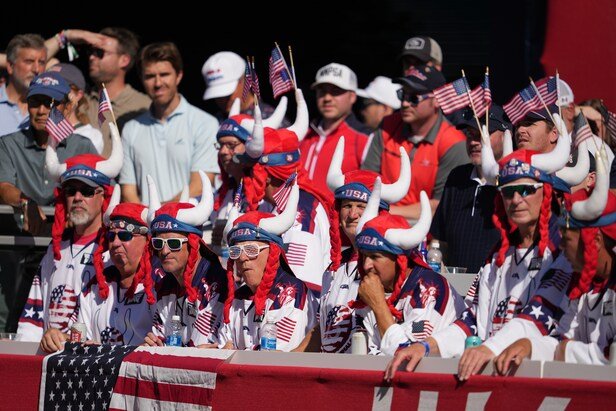FARMINGDALE, N.Y. — They were large in number but not in voice. This Ryder Cup crowd was supposed to be America’s secret weapon—so spirited it would rattle European nerves and perhaps cross every line of decorum. Instead, the loudest sound at Bethpage Black was the lack of it, delivering an unmistakable verdict: European fans simply do it better.
That indictment may seem harsh, condemning an entire nation based on one Friday’s evidence. Sure, the American team offered little to celebrate, getting outplayed for most of the day. But this wasn’t some late-arriving Los Angeles crowd more concerned with the afterparty. These fans woke at 3 a.m. some never sleeping at all, camping out to claim first-tee seats. The 3,500-seat amphitheater packed within minutes of the 5 a.m. gate opening, two hours before the first match would come through. This is what Ryder Cup desperation looks like: once every four years on home soil, maybe once in a lifetime in your backyard if geography smiles on you. The first tee is supposed to be transcendent—that rare moment where golf sheds its country club politeness and becomes tribal theater. Players are supposed to get choked up by the reception or fight nerves in front of a crowd doing everything possible to tip the scales.
Advertisement
Instead, the unforgettable scene was aggressively forgettable.
Maybe it was exhaustion, those early wake-up calls extracting their toll. Maybe the deafening DJ, who seemed convinced 50,000 people had paid Ryder Cup prices to hear his playlist, had beaten them into submission. But excuses don’t explain away what should have been a wall of sound reduced to scattered, uncoordinated bleats. This wasn’t a golf crowd—it was a social media event with golf happening nearby. Phones stayed raised, voices stayed lowered. When an emcee desperately tried to orchestrate a USA chant, the crowd couldn’t even synchronize three syllables. U…S…A became a stuttering mess, proof that Keegan Bradley wasn’t the only American making mistakes that morning.
The DJ and emcee are easy targets, but they were symptoms, not the disease. They reflected a crowd that had fundamentally misunderstood its assignment. Throughout the opening session, American galleries remained politely reserved while their team got dismantled. The morning’s biggest roar? Nine a.m., when beer stations opened for business.
Here’s the damning truth: The Europeans were doing their part to keep things quiet, yet somehow a home crowd still couldn’t muster defiance. A crowd that defers to its opponents isn’t formidable—it’s defeated before the first shot is struck. We know better is possible because European galleries, match after match, tournament after tournament, generate their own electricity, and that includes Friday. It’s worth remembering due to COVID protocols that Europeans couldn’t travel to Whistling Straits in 2021. That pent-up energy came flowing out to those that showed up to Long Island. They didn’t wait for permission or their team to play well. They just show up and make noise.
Advertisement
This exposes the fundamental difference between us and them. European fans don’t just understand their role; they’ve mastered it in ways Americans seem constitutionally incapable of grasping. They operate on an different creative plane, crafting unique chants for individual players and belting out anthems that wouldn’t sound out of place echoing through a Manchester pub at 2 a.m. Silly, but huge in heart and soul. Their jeers cut deep while somehow staying above the belt. Patrick Cantlay, for example. In Rome 2023, when reports surfaced that he was protesting player payments by going hatless, European galleries turned gossip into theater within hours: “Hats off to the bank account!” By Friday at Bethpage, they’d evolved the anthem: “Cantlay’s got his hat on hip hip hip hooray, Cantlay’s got his hat on so he must be getting paid.”
It borders on grade-school rhyming, yet captures exactly what Ryder Cup crowds should be—passionate, creative, and fundamentally good-natured even when taking shots.
Americans? We offer “USA! USA! USA!” and … well, that’s our entire playbook. When we do attempt creativity, it’s usually just cruelty with a punchline. Rory McIlroy faced F-bombs, taunts about his Pinehurst collapse, and invasive comments about his personal life—earning him every right to flash that one-finger salute Friday afternoon. These moments draw uncomfortable chuckles from fans too embarrassed to fully acknowledge what they’re hearing.
The irony of Friday is it didn’t approach the worst-case scenarios everyone feared about American crowd behavior. Conversely, that uncouth passion—the very thing we worried about—would have been a massive improvement over the indifferent silence that actually showed up.
Advertisement
Friday delivered a blow to the mythology of the tough, rebellious New York sports fan. Sure, there’s an argument that the PGA of America—with its $1,000 tickets and endless corporate hospitality tents—priced out the blue-collar voices that make Madison Square Garden and Yankee Stadium and past Bethpage tournaments genuinely intimidating. When you turn sporting events into luxury experiences, you shouldn’t be surprised when the crowd behaves like they’re at the opera. But that’s the easy excuse. The truth is that something inherently separates how Americans cheer from how Europeans support, and their way simply works better. It’s about understanding that being a great sports fan requires inventiveness, commitment, and a willingness to look slightly ridiculous in service of something larger than yourself.
We know this stings. America was built on rejecting European supremacy, and we love reminding those across the Atlantic that we bailed them out of two World Wars. But refusing to acknowledge what happened at Bethpage is refusing to acknowledge reality—and reality doesn’t care about our national pride. Maybe it’s not entirely our fault. Europeans might simply be better at the fundamental human experience of collective joy. They gave the world democracy, capitalism, the printing press, and Italian cuisine. We gave them the Real Housewives franchise and Twitter outrage. When it comes to creating moments of shared passion and community celebration, it’s not even a fair fight.
But fair fights don’t win Ryder Cups. If American fans want to make this a contest over the weekend, they’ll need to summon the passion that never appeared on Day 1. They don’t need to be their most polite selves or worry about looking foolish, and the question isn’t whether American fans can find that fire. It’s whether they’re willing to swallow their pride long enough to learn from the very people they’re supposed to defeat.
Read the full article here














